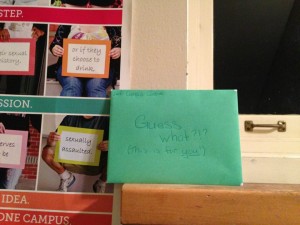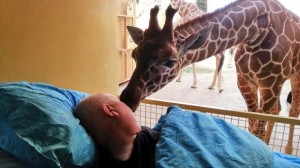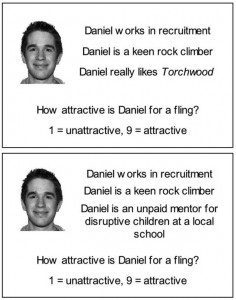
Photo by camerabee on flickr.
I recently had the chance to talk to a Lafayette student, Emily Crawford, who created a club that writes anonymous “love letters” and distributes them randomly around campus. The club is called Lafayette Campus Cursive and I think this group is an excellent example of a kindness initiative. Through the letters, the group essentially spreads positivity throughout the campus community, and as Emily explains, it has proven rewarding for both those writing the letters and those receiving them. Here’s some great points from our conversation.
Me – What was your inspiration for creating Lafayette Campus Cursive?
Emily – Campus Cursive is a branch of More Love Letters, a larger organization that was founded by a woman who started leaving anonymous letters around NYC as a way to cure the blues of moving to a big, new place…There are branches of the organization on many college campuses across the country, and I just happened to stumble across their website and decided it would be a nice addition to our campus and community.
Me – That’s so cool how it blew up out of one person’s act of kindness. Can you just outline for me what Campus Cursive does?
Emily – Last year, Campus Cursive would meet to write anonymous letters and then would drop them anywhere on campus. More Love Letters also puts out letter requests, when you can write to the organization and request a bundle of letters written to a specific person in your life, so we would also meet and write those and then I would send them off… The way it was set up last year was the writers could either choose to drop them around campus themselves, or I would go around after we met and stick them places – in the library, on bulletin boards, on a staircase. We usually write “Read me!” or “I’m for you!” on the envelopes to encourage people to pick them up and read them.

One of the anonymous letters (from Campus Cursive’s Facebook page)
Me – That’s awesome. Why do you think these organizations were created and why have they spread across the country?
Emily – I think generally both More Love Letters and Lafayette Campus Cursive exist just to make the world a better place and to brighten people’s days.
Me – What kinds of things do you generally write in the letters?
Emily – There’s no formula for what to write in a love letter, only that they’re not traditional love letters, not Romeo and Juliet-esque. The letters can be whatever the writer wants, something empowering or motivating or uplifting, even just a simple “I hope you remember to smile today”. Sometimes people write notes encouraging a reader to keep their head up, don’t stress too much over midterms, tell people in your life you love them, or remind them that life is short and there’s always reasons to be happy.
Me –What do you think makes receiving something as simple as a letter so special and uplifting for a person, even when it’s anonymous?
Emily – One of the reasons I think that More Love Letters and Campus Cursive are so great is because they use handwritten notes to spread joy and happiness. I think it’s so rare to get a handwritten note that it adds to the experience and somehow feels more meaningful when you receive them, more personal. I think writing notes to your friends or people you know is also great, but I find this system really interesting because you won’t know who reads it, and they don’t know who wrote it. The total anonymity is a kind of freedom, and at least for me whenever I write these letters I get a lot out of it in return.
Me – Can you explain a little more about what you get out of it? Can you give an example?
Emily – If I write a note about keeping calm during finals week or keeping everything in perspective, I know it’ll probably go to someone who’s stressed out and has 47 different things on their plate – like me. So when I write it I also take what I’m saying to heart. It’s like therapy that helps both you as the writer and hopefully someone else as the reader.
Me – Have you ever received a random letter yourself?
Emily – I have received a random letter! It was so exciting and it totally made my day. I think that the whole concept of random letters reminds people that there’s a ton of other people around you who care about you, even if they don’t know you at all.
Me – Overall, what kind of impact do you think Campus Cursive has had on Lafayette?
Emily – I think it brings us together as members of a campus and as a community. Sometimes we forget that we aren’t alone when we run to class or are focused so much on ourselves. I hope that writing and receiving the love letters makes people reflect about belonging to something bigger than themselves.
To me, Emily’s words perfectly sum up why simple acts of kindness are important on a collective level seeing as they contribute to an enhanced sense of community. Who knows what we are capable of when we spread a little positivity one random letter at a time?
——————————–
Just some background info:
Emily is a junior from Long Island, NY double majoring in Psychology and Women’s & Gender Studies. She is also a LANDIS volunteer at Safe Harbor, a Lafayette Ambassador, an EXCEL Scholar, and a student caller at Phonathon.
To join Campus Cursive, simply ‘like’ their Facebook page! – https://www.facebook.com/LafCampusCursive
Check out More Love Letters







Recent Comments